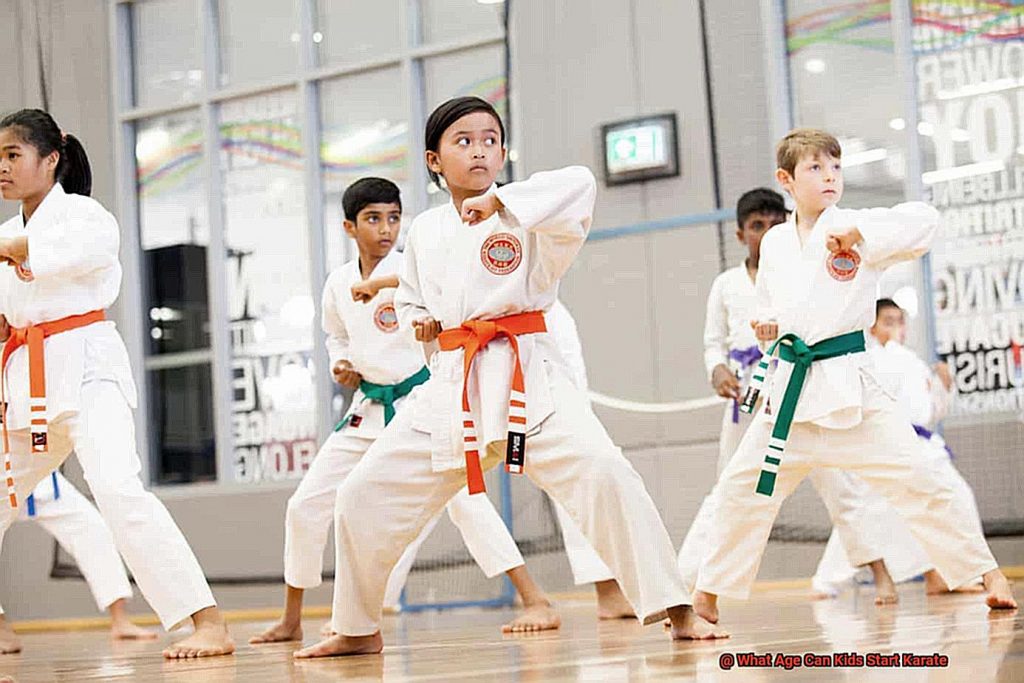Karate is an incredible way for children to get active, learn self-discipline, and gain confidence.
But at what age should kids start? Surprisingly, it’s never too early.
Experts suggest starting as young as three years old.
In a safe environment, karate helps develop physical coordination and body awareness.
Plus, classes provide an opportunity to socialize with peers and form healthy habits that will last into adulthood.
As children get older, they can focus on more advanced aspects of karate like sparring and forms (kata).
Sparring teaches self-defense skills while the styles help instill discipline and respect through memorizing sequences of movements.
With proper instruction, these skills can be mastered regardless of age.
Karate isn’t just about physical fitness; it’s also about mental growth.
Children build confidence in their abilities while learning how to set goals and work towards them systematically.
As they progress through the belt system they’re rewarded for hard work and dedication – encouraging positive behavior both inside and outside the dojo (karate studio).
So when should your child start karate? The answer is now. With so many health benefits there’s no reason why your child shouldn’t give it a try.
The Basics of Karate Training for Kids
Karate is an ancient martial art that has been passed down through generations, and it’s a great way for kids to learn discipline and compassion while also building physical strength and agility.
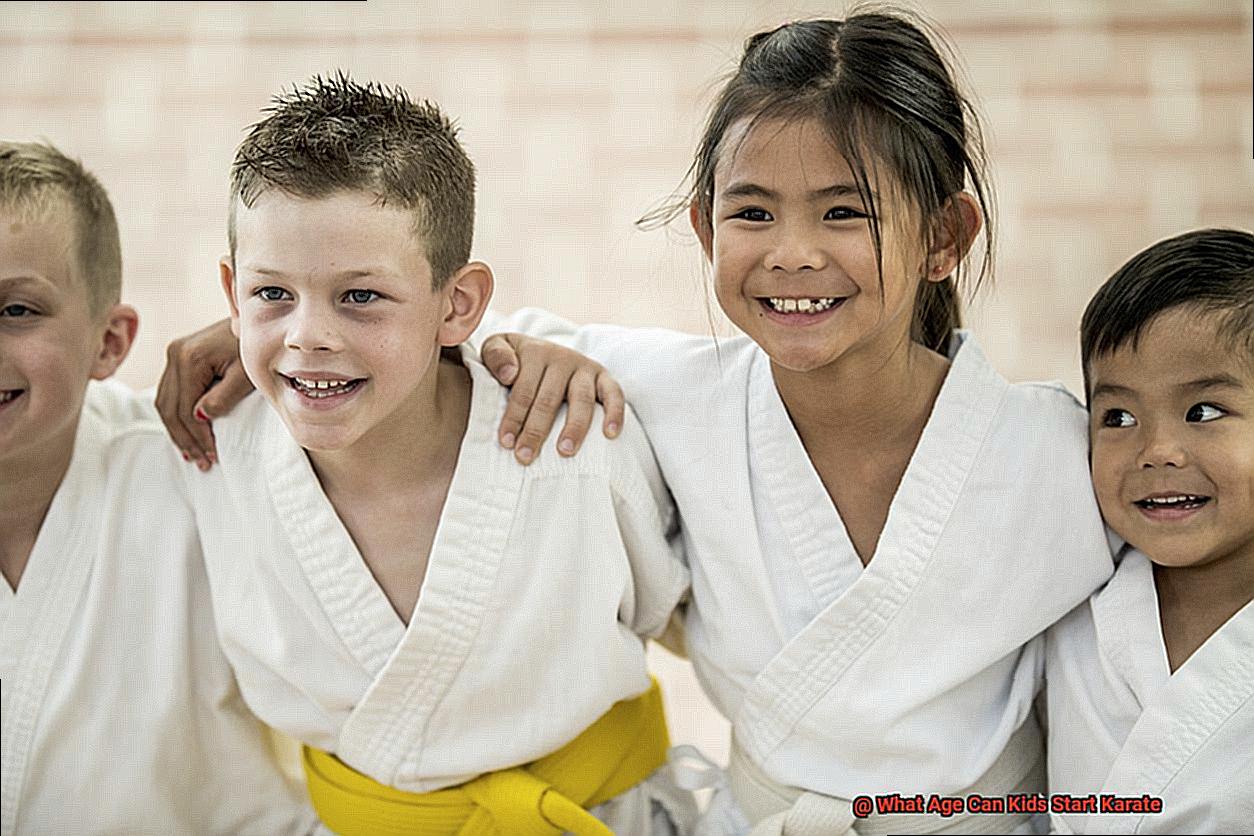
The basics of karate training for kids include proper body posture, basic movements and stances, blocks, strikes, kicks, and throws.
Kids can begin learning these skills at any age with the guidance of a licensed instructor, but the optimal time to start is usually between 4-7 years old.
Karate is like a game of punches and kicks. Kids can explore their creativity as they practice their moves – just like a choreographed dance routine.
As they progress in their skillset, they will gain confidence in their physical capabilities while also improving their mental focus and discipline.
Karate training for kids is an enjoyable way to build endurance, agility, admiration, and discipline while having fun. It’s important to have proper instruction to ensure that kids learn the basics correctly and safely.
Advantages of Starting Karate at a Young Age
Are you looking for an activity that will help your child stay active, build strength and endurance, and boost self-confidence? Then karate is the perfect fit. Starting karate at a young age can bring many health benefits that can last a lifetime.
Karate is an excellent way for kids to stay physically fit.
It helps them develop better coordination, balance, and agility.
It also promotes mental stability by increasing focus and discipline.
Kids learn how to communicate in a positive manner while still respecting each other’s differences.
Karate provides children with positive role models who can guide them in the right direction.
They are taught self-defense skills that help them shield themselves if necessary.
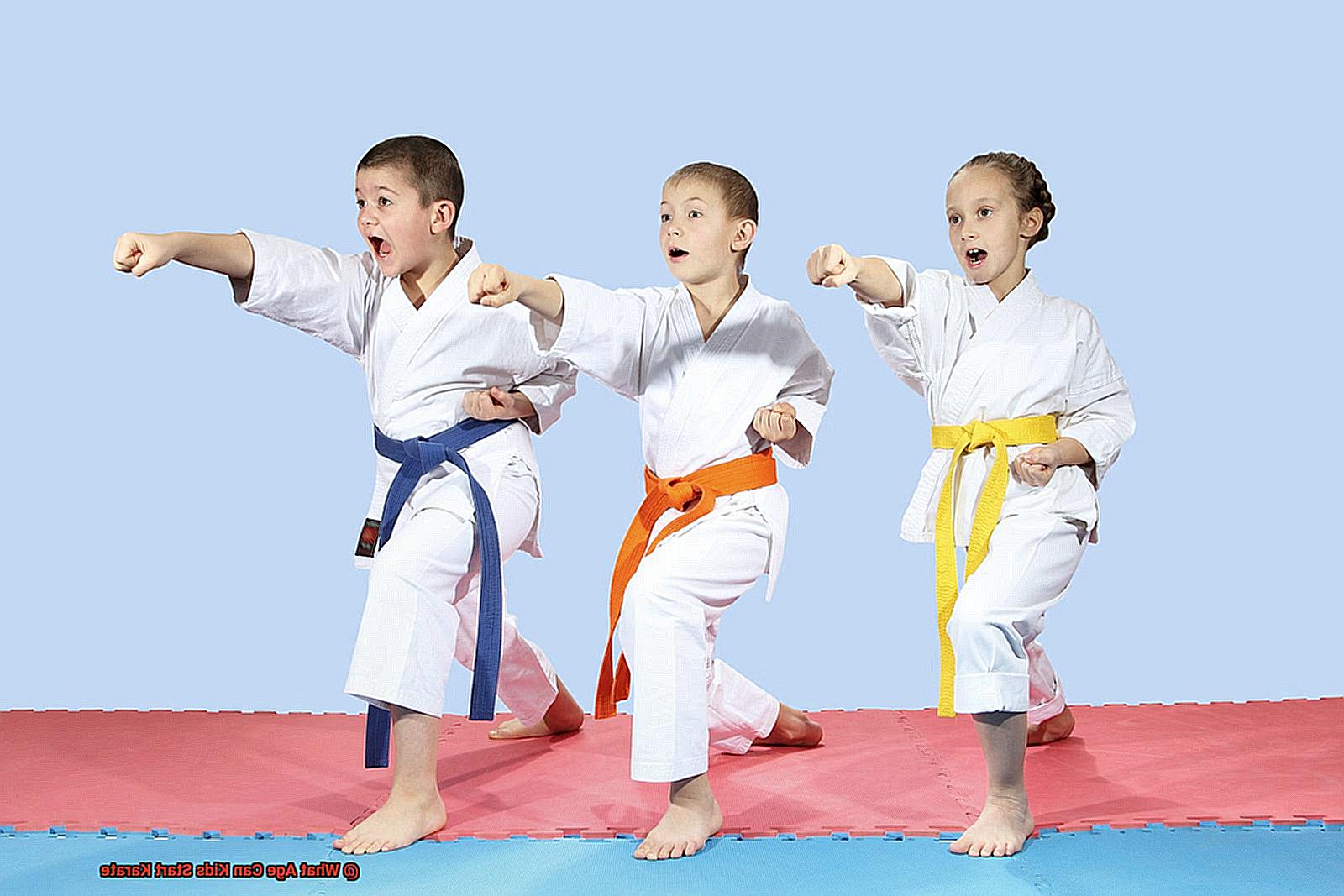
Karate teaches kids how to block an attack or take down an attacker without causing harm – it’s like having their own personal bodyguard.
Karate is a fantastic sport for young children that can provide them with lifelong benefits such as improved physical and mental health, enhanced social skills, positive role models, and self-defense techniques.
The Right Age to Start Karate
Karate is an amazing activity for children to get some exercise and learn valuable life skills.
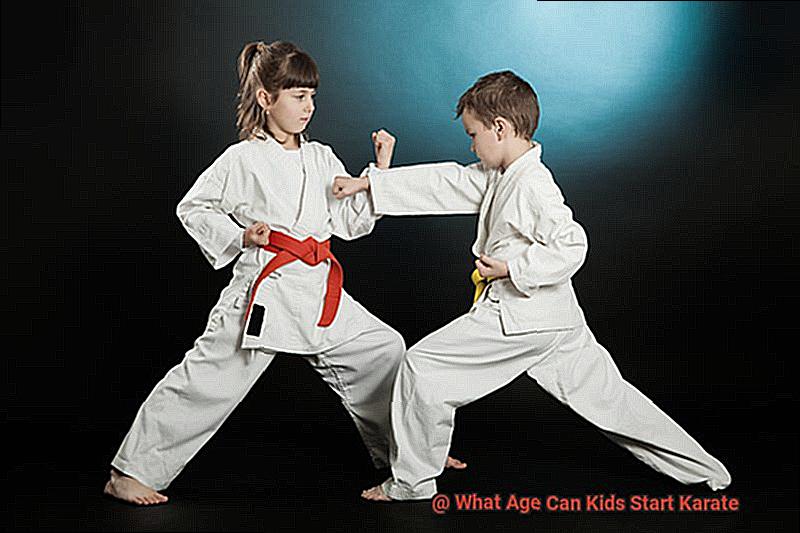
But when is the perfect age to start? According to experts, the ideal age for kids to begin karate is between 5-7 years old.
At this age, children are physically and mentally mature enough to take on the physical demands of karate.
When deciding if a child is ready for karate, it’s important to consider their individual growth.
Karate can help them develop better motor skills, coordination, and balance while teaching them discipline and respect for themselves and others.
Parents should make sure that their child is in a safe environment with certified instructors who can provide guidance and support as they learn the basics of karate.
Karate can be thought of as a journey, one that starts with small steps such as learning how to do a good punch or kick.
As your child grows, they will learn more advanced strategies like blocking and counter-attacks.
Physical and Mental Development from Karate Training
Karate is a fantastic way for kids to develop both physically and mentally.
Through karate training, they can strengthen their muscles, enhance their agility, and sharpen their coordination.
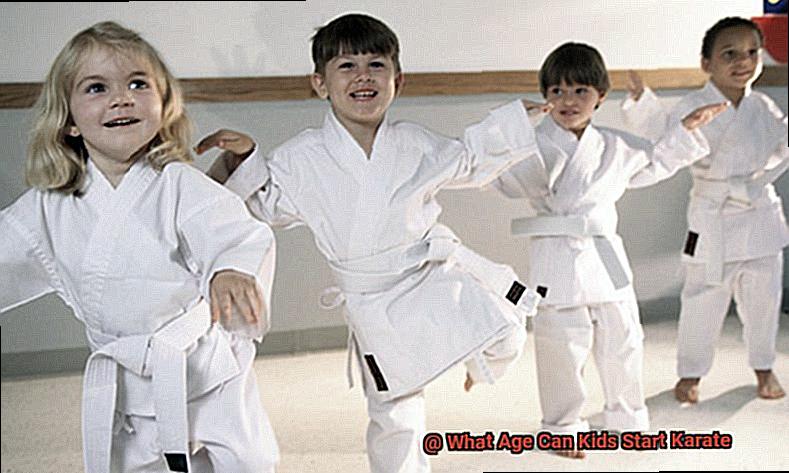
Balance, posture, and reflexes are all improved with regular practice.
Motor skills and physical fitness also receive a boost from karate training.
But the benefits don’t stop there. Karate also helps children cultivate mental discipline and focus.
They learn patience and perseverance as well as respect for themselves and others.
Self-control is also developed through karate as kids learn how to handle difficult situations with grace.
Finally, karate helps children become more aware of their surroundings and build confidence in their abilities.
Karate is like a superpower for young minds. It’s an incredible way for children to develop both inside and out – it’s like a double whammy of awesomeness.
Positive Effects on Personal Traits and Values
Karate is an invaluable tool for teaching children essential personal traits and values.
It can help them hone their self-discipline, focus, and composure even in the most trying of circumstances.
With regular practice, kids can become more confident in their abilities and increase their self-esteem.
Respect and humility are also important values that karate helps instill in its practitioners.
Through karate, kids learn to take ownership of their decisions and become better problem solvers.
Karate is like a vegetable garden for personal development – it requires dedication, practice, and patience to cultivate the values needed for a successful life.
Karate teaches children how to remain calm during storms and stand tall against high winds.
It helps them develop a sense of accountability for their behavior so they can make informed decisions as adults.
Karate is an excellent way to help children grow into confident, responsible adults.
Impact on Wellbeing and Social Behavior
Karate is the ultimate superpower for kids. Not only does it provide them with physical fitness and strength, but it also has a major impact on their wellbeing and social behavior.
When it comes to children’s health and development, karate is an invaluable tool.
Karate can help children become more confident in themselves, as well as more aware of their surroundings.
It can also help them develop better social skills and self-discipline, which can lead to healthier relationships with peers and adults.
In addition, karate training can improve physical health, both mental and physical.
It reduces stress levels, boosts coordination, balance, and flexibility – all essential traits for growing minds and bodies.
Karate classes for kids are like giving them a secret weapon – they have been shown to improve focus and concentration, allowing them to stay on task longer and be more productive in school.
And finally, karate training has been linked to improved behavior in the classroom and at home – it’s like giving kids an invisible shield that helps prevents them from making bad decisions.
Safety Guidelines for Starting Karate at a Young Age
When it comes to enrolling your child in karate classes, safety should be top priority.
Before signing up, make sure the training environment is secure and suitable for kids of all ages.
Investigate the instructors’ qualifications, the safety regulations of the facility, and any other potential risks.
The instructor should be a pro at teaching children how to practice karate safely and effectively.
They should also know how to prevent injuries when sparring.
Make sure your child is properly equipped with protective gear such as headgear, mouthguards, and sparring pads in order to shield them during sparring sessions.
Parents should also ensure that their children are physically fit enough to take part in karate lessons and have a thorough understanding of the rules and regulations of the sport.
It’s like a dance between two couples – you’ll want to know all the steps in order to remain safe on the mat.
If done right, karate can be an incredibly rewarding experience for young students.
Do your due diligence before enrolling your kid so they can enjoy this martial art with no reservations.
Tips for Parents to Help Their Kids with Karate Training
Karate is an excellent way for children to learn discipline, respect, and self-defense.
As a parent, it’s essential to support your child’s karate training program by providing guidance and encouragement.
Here are some tips to help you do just that.
Encourage goal-setting
Setting goals is an integral part of any karate education program.
Assist your child in creating achievable objectives that will keep them motivated and focused on their progress.
This could include mastering a specific technique or competing in a tournament.
Monitor progress regularly
It’s important to monitor your children’s development regularly in order to make sure they are getting the most out of their karate lessons.
Check in with your child and their instructor often to ensure they are staying on track with their plans and goals.
Provide positive reinforcement
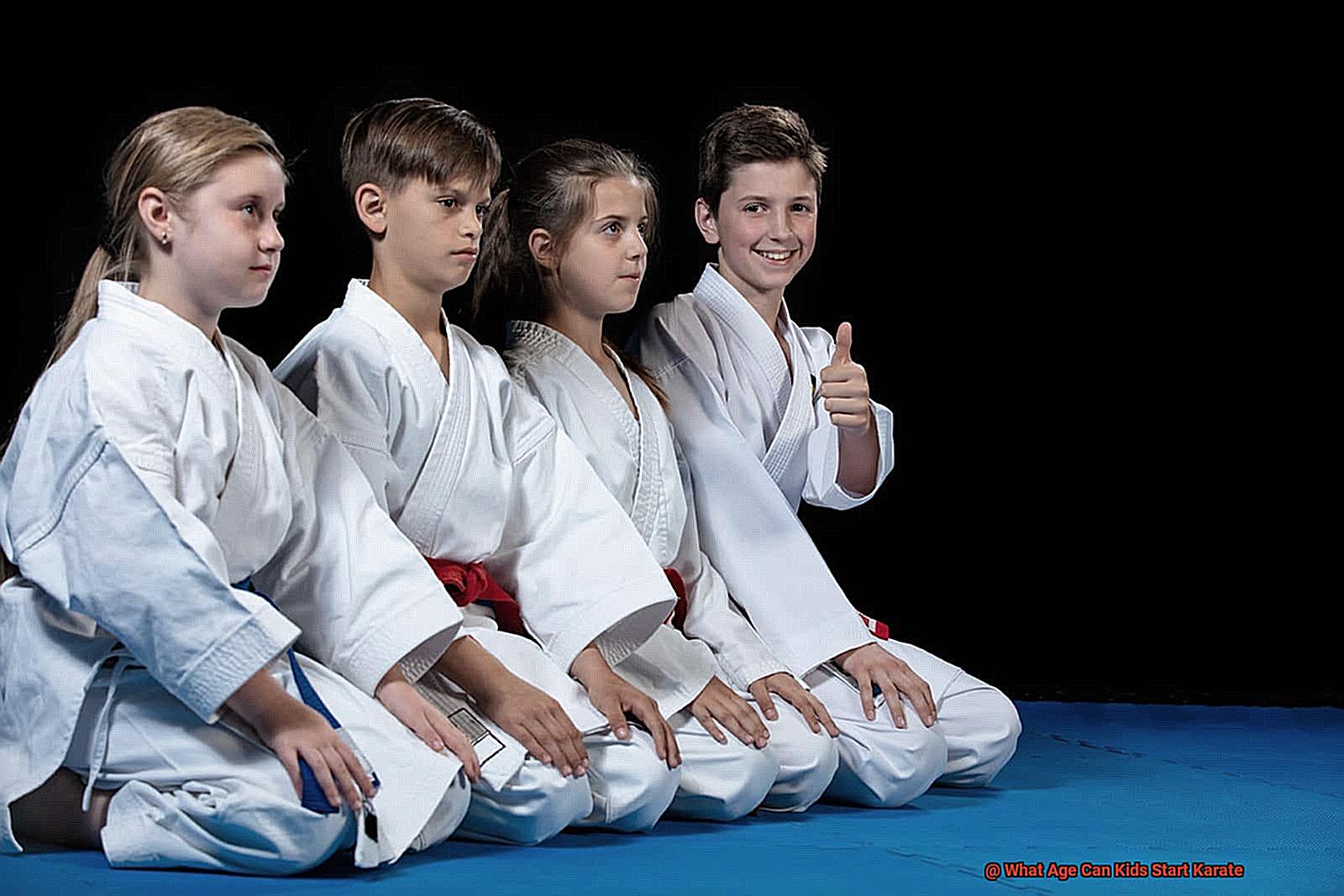
Positive reinforcement is key when it comes to helping kids stay engaged and motivated in their karate training program.
Make sure you give plenty of praise and encouragement when they do well, as this will help them stay focused and on task.
Be supportive
Karate can be a difficult sport, so it’s important for parents to be supportive of their children throughout the process.
Let them know that you believe in them and are always there for them if they need help or support.
Get involved
Getting involved in your child’s karate training program can be a great way to show your support and help motivate them to keep going with it.
Attend classes with them, help out with drills or exercises, or just cheer them on from the sidelines. It’s like having an extra coach – only better.
Conclusion
Karate is a great way for children to stay active, build life skills, and develop both physically and mentally.
When deciding if they’re ready for karate, parents should take into account their child’s growth and ensure that the basics are taught properly and safely.
Karate can help children cultivate self-discipline, focus, respect for themselves and others, and help them realize their potential.
Plus, it provides positive role models who can guide them in the right direction.
With dedication and tenacity, your child can reach new heights in their martial arts journey.
As a parent, it’s essential to have information and support throughout the process.

